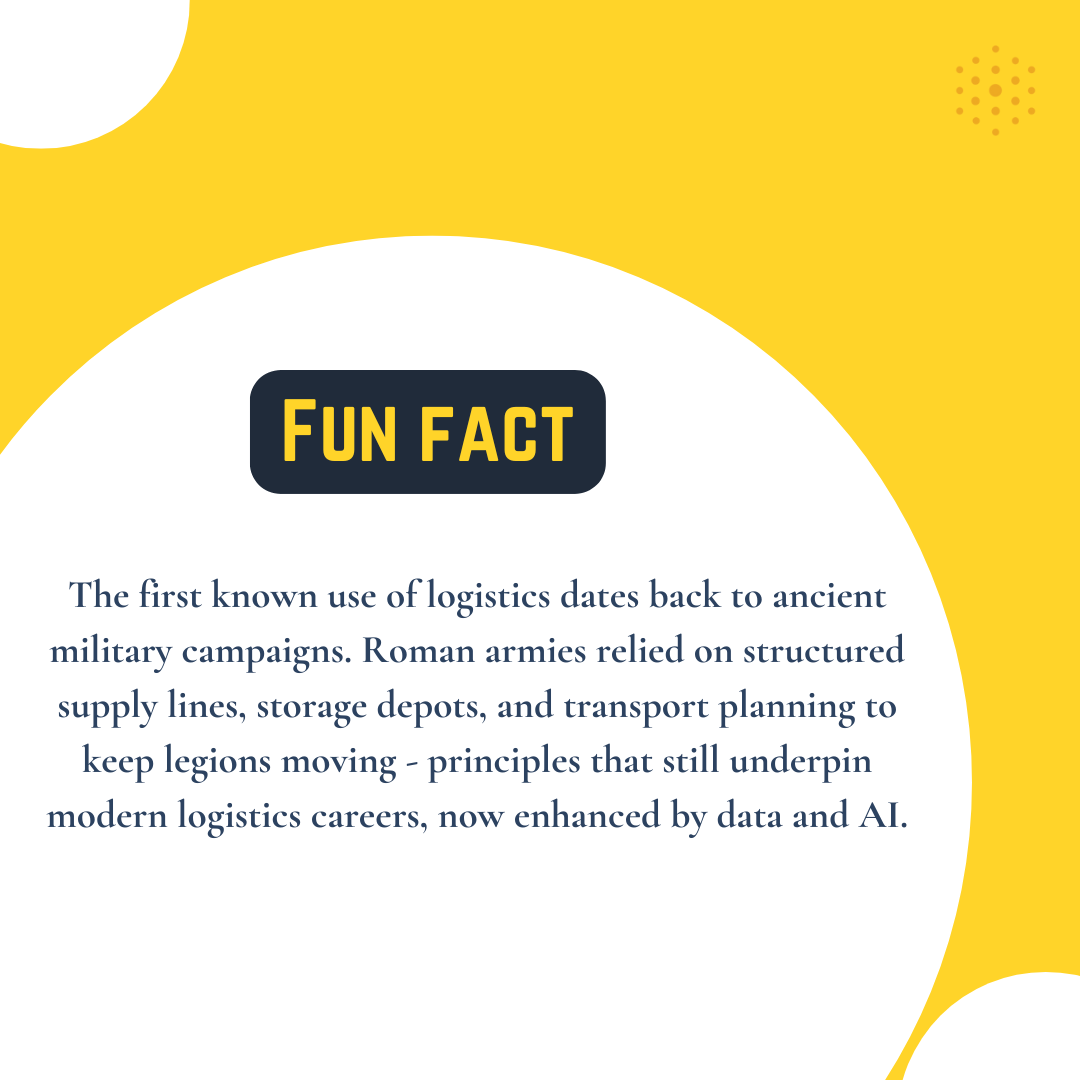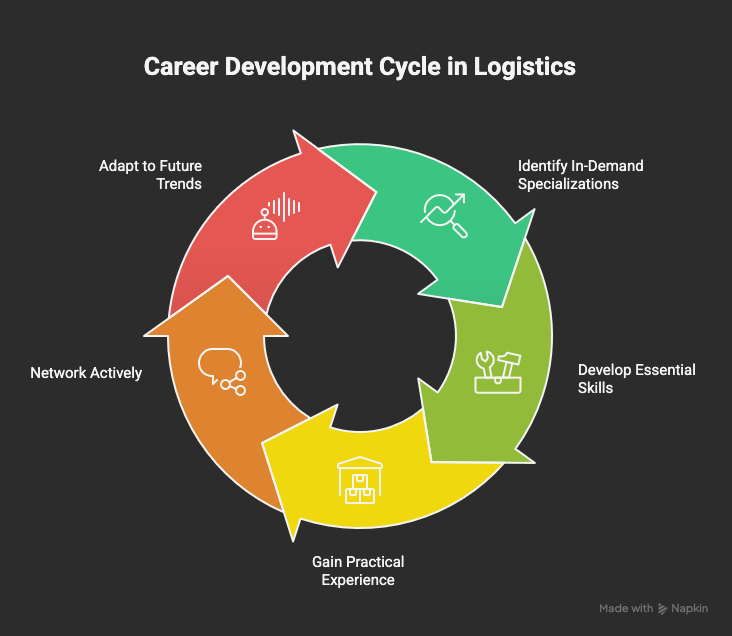How can you build a thriving career in transportation and logistics?
Focus on fast-growing specializations like supply chain analytics, green logistics, and last-mile delivery. Build technical and soft skills, gain certifications such as APICS or Lean Six Sigma, and combine practical experience with digital fluency to stand out in this data-driven, tech-powered industry.
Thinking about a career in transportation and logistics? You’re looking at one of the fastest-growing fields out there.
According to BLS, employment for logisticians is projected to grow 17% from 2024-2034, much faster than average, thanks to e-commerce growth and digital operations.
That means more opportunities, but also more competition.
This T&L career guide breaks down where the best roles are, which skills employers value most, and how to get started.
Here are the essentials you need to know.
1. What Are the Most In-Demand T&L Specializations Right Now?
Focus on high-growth niches like supply chain technology, data analytics, green logistics, and last-mile delivery.
These specializations are expanding rapidly as the industry moves away from traditional operational roles and toward more strategic, technology-focused functions driven by e-commerce and global connectivity.
These aren't your grandfather's trucking jobs. The modern logistics landscape is being reshaped by technology and consumer expectations.
Here’s where the real opportunities are:
- Supply Chain Technology & Analytics: The industry is overflowing with data from IoT sensors, vehicle telematics, and digital freight platforms. Companies desperately need professionals who can make sense of it all. Roles like a Supply Chain Analyst or a data scientist who can use analytics to predict demand, optimize routes, and prevent disruptions are in extremely high demand. The adoption of digital technologies in the supply chain is a top priority for 83% of companies, according to a Statista survey, making tech proficiency a golden ticket.
- Green Logistics & Sustainability: As consumers and regulators demand more eco-friendly practices, companies are investing heavily in sustainable supply chains. This has created a surge in roles focused on reducing carbon emissions, implementing circular economy principles (like managing returns and recycling), and ensuring ethical sourcing. A report by the MIT Center for Transportation & Logistics highlights that pressure from customers is a primary driver for corporate sustainability efforts, making this a critical business function.
- Last-Mile Delivery Management: The e-commerce boom has made the final step of the delivery process - the "last mile", one of the most complex and expensive parts of the supply chain. This has created a huge need for specialists such as Last-Mile Delivery Managers, Drone Operations Leads, Autonomous Fleet Supervisors, and Urban Logistics Coordinators who can manage urban delivery networks, drone delivery programs, and autonomous vehicle fleets. ARK’s recent report predicts that drones will be responsible for over 20% of deliveries within 5 years.
2. What Skills Truly Matter in Modern Logistics?
Beyond basic industry knowledge, employers are desperately seeking data literacy, proficiency with logistics software (TMS, WMS), and sharp analytical skills.
In a sector defined by constant disruption, soft skills like complex problem-solving skills and adaptability are just as critical as technical know-how.
To succeed, you need a toolkit that blends technical expertise with strategic thinking.
Technical Skills
- Data Analysis: You must be able to interpret data to make smarter decisions. This means understanding how to use tools like Excel, SQL, or even Python to analyze shipping times, inventory levels, and freight costs. The ability to translate data into actionable insights is what separates a good Logistics Coordinator from a great one.
- Software Proficiency: Familiarity with industry-standard software is non-negotiable. This includes Transportation Management Systems (TMS) like Blue Yonder or Oracle TMS, Warehouse Management Systems (WMS) such as Manhattan or Fishbowl, and Enterprise Resource Planning (ERP) software like SAP S/4HANA.
- Project Management: Every shipment is a project with a budget, timeline, and stakeholders. Strong project management skills are essential for overseeing complex logistical operations, from sourcing raw materials to final delivery.
Soft Skills
- Adaptability: A container ship gets stuck, a supplier misses a deadline, or a snowstorm shuts down a major highway. Your ability to pivot quickly and find solutions under pressure is paramount.
- Strategic Communication: You'll be coordinating with a diverse group of people, including warehouse staff, truck drivers, international suppliers, and C-suite executives. Clear, concise communication skills are vital to keeping the supply chain moving smoothly.

3. How Can You Gain Relevant Experience Without a Degree?
Target foundational roles like a warehouse associate or dispatcher to learn ground-level operations and prove your work ethic.
Simultaneously, pursue industry certifications like the APICS Certified Supply Chain Professional (CSCP), which are often more valuable to employers than a general four-year degree.
While a degree can help, it's not the only path into a successful logistics career. Many companies value practical skills and industry-specific knowledge more.
- Earn High-Value Certifications: ASCM (APICS) Certifications: The Certified Supply Chain Professional (CSCP) and Certification in Logistics, Transportation and Distribution (CLTD) are globally recognized credentials that demonstrate a deep understanding of the industry. Lean Six Sigma: These process-improvement methodologies are highly applicable to logistics, where efficiency is everything. Earning a Green or Black Belt can significantly boost your career prospects.
- Start with Foundational Roles: Don't underestimate the value of starting on the ground floor. Working as a Warehouse Associate or dispatcher provides an unparalleled understanding of how logistics work in the real world. This hands-on experience is invaluable context for future management roles.
- Look for Apprenticeships: Many large freight and logistics companies offer apprenticeship programs that provide paid, on-the-job training and a direct path to a stable career.
4. What's the Best Way to Network in the T&L Industry?
Go beyond passively connecting on LinkedIn. Actively join and participate in professional organizations like the Council of Supply Chain Management Professionals (CSCMP), attend major industry trade shows, and seek out informational interviews with professionals in roles you admire.
Networking is about building genuine relationships, not just collecting contacts.
- Join Professional Organizations: Groups like CSCMP and ASCM (formerly APICS) are invaluable resources. They offer webinars, local chapter meetings, and conferences that put you in the same room as industry leaders and decision-makers.
- Attend Industry Trade Shows: Events like MODEX and ProMat showcase the latest in logistics technology and solutions. They are fantastic opportunities to learn about emerging trends and connect with potential employers.
- Conduct Informational Interviews: Find people on LinkedIn who have the job you want in five years. Reach out and ask for 15 minutes of their time to learn about their career path. This is a highly effective, low-pressure way to get expert advice and expand your network.
5. What Does a Future Career Path in Logistics Look Like?
The career path is no longer a straight ladder; it's a lattice. Expect to move between roles in operations, analytics, and technology.
Future industry leaders will be those who can manage automated systems, interpret complex data, and build resilient, sustainable supply chains.
The logistics professional of tomorrow is a hybrid talent, part operations guru, part data scientist, and part strategist.
- Managing Automation: As warehouses and freight networks become more automated, the demand will shift from manual labor to professionals who can design, implement, and manage robotic systems. A future Warehouse Supervisor will likely need skills in robotics process automation (RPA).
- Leading with Data: The most successful future leaders will be those who are deeply comfortable with data. A Supply Chain Manager will rely on predictive analytics and AI-driven insights to make strategic decisions.
- Building Resilience: In the wake of global disruptions, companies are focused on creating supply chains that are agile and resilient. This creates incredible opportunities for strategic thinkers who can design networks that can withstand future shocks, a key focus for any modern Director of Operations.

Wrapping Up
Building a career in transportation and logistics takes more than knowing how goods move, it’s about mastering data, technology, and strategy in a fast-changing industry.
From high-demand specializations to critical skills and certifications, you now have a roadmap to get started.
And while the journey is yours, the right support can make it smoother.
Hiration can help you every step of the way - whether it’s creating an ATS-friendly resume, optimizing your LinkedIn profile, or practicing interviews tailored for logistics roles.
With the industry growing at record speed, now is the time to prepare and Hiration can help you stand out.
Transportation & Logistics Career — FAQ
Is logistics a good career choice in 2025?
Yes. The U.S. Bureau of Labor Statistics projects a 17% job growth for logisticians between 2024–2034—much faster than average—driven by the expansion of e-commerce and digital supply chain operations.
Which logistics specializations are in highest demand?
Top fields include supply chain analytics, green logistics, and last-mile delivery. These areas combine sustainability, data science, and automation, creating major opportunities in both tech and operations roles.
What key skills are required for success in logistics?
Employers seek data literacy, project management, and proficiency in logistics software (TMS, WMS, ERP). Soft skills like adaptability, problem-solving, and clear communication are equally critical for managing disruptions.
Can I build a logistics career without a degree?
Yes. You can start in entry-level roles like dispatcher or warehouse associate, earn certifications like APICS CSCP or Lean Six Sigma, and move up through hands-on experience and continuous learning.
What certifications are valuable in logistics?
Highly regarded certifications include APICS CSCP, CLTD, and Lean Six Sigma (Green or Black Belt). These credentials demonstrate expertise in supply chain optimization and operational efficiency.
How can I network effectively in this industry?
Join professional associations like CSCMP and ASCM, attend logistics trade shows (MODEX, ProMat), and schedule informational interviews with professionals to gain insights and expand your network authentically.
What does a typical logistics career path look like?
Expect a non-linear journey—moving across operations, analytics, and technology. Roles evolve toward automation management, data-driven decision-making, and building resilient, sustainable supply networks.
How is technology shaping the future of logistics?
Automation, AI, and predictive analytics are transforming the field. Professionals who can integrate robotics, manage data insights, and streamline supply chains will lead the industry’s next evolution.
What’s the best way to future-proof my logistics career?
Invest in continuous learning—embrace digital tools, sustainability, and cross-functional leadership. The ability to adapt, analyze, and innovate will keep you competitive in this rapidly evolving field.



